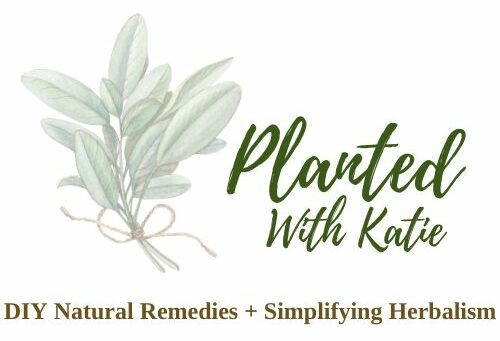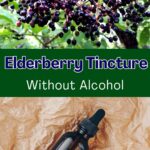Easy Elderberry Tincture Recipe Without Alcohol
Creating your own herbal medicine is simple and rewarding, and this Easy Elderberry Tincture Recipe Without Alcohol is a perfect place to start. Packed with immune-boosting benefits, this alcohol-free tincture is safe for the whole family and easy to make at home.
Elderberries, especially the black elderberry (Sambucus nigra), are an amazing natural remedy. They are packed with vitamin C and other nutrients that support your immune system, especially during the winter seasons and flu season.
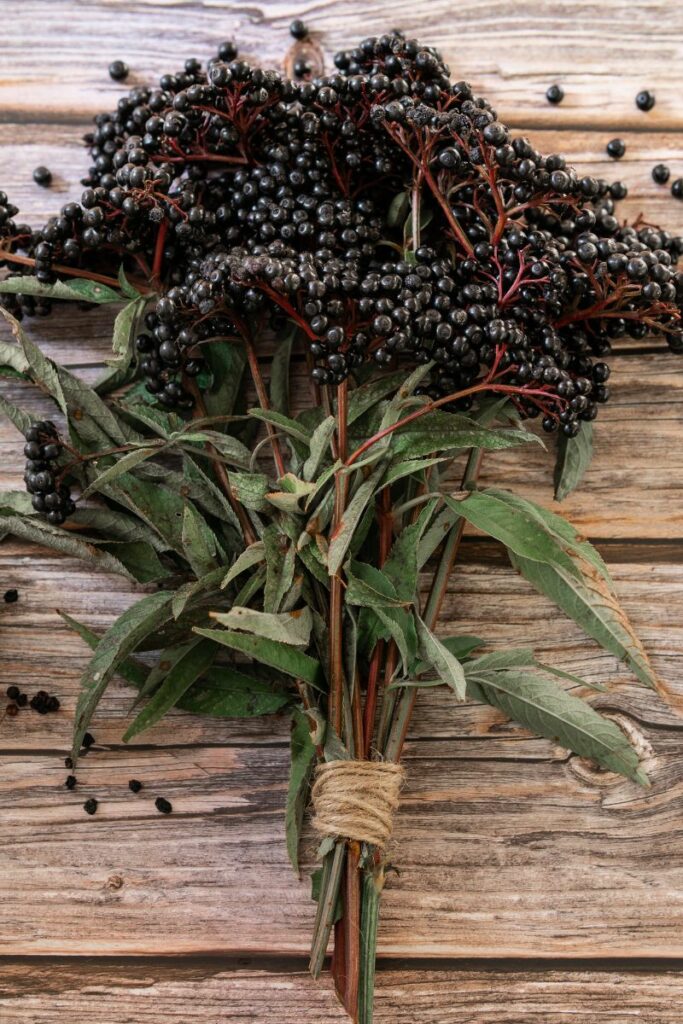
Disclaimer: This is not medical advice. Information and statements shown here are for educational and informational purposes only and are not to replace the advice of your healthcare professional.
This post may include affiliate links. Please refer to our disclaimer for full disclosure.
Using elderberries in herbal tinctures is a great way to make herbal medicine. But, some people have alcohol sensitivities or prefer not to use alcohol. That's where glycerin tinctures come in! Glycerin tinctures are a perfect option for those who want to avoid alcohol but still want to enjoy the benefits of elderberries.
This recipe is super easy and perfect for your first time making your own elderberry tincture. It uses simple, organic ingredients and doesn't take a lot of time or effort. In just a few steps, you'll have a fantastic, alcohol-free elderberry tincture ready to help keep your family healthy all school year long!
What is an Elderberry Tincture?
An elderberry tincture is a type of herbal extract made from elderberries, usually the black elderberry (Sambucus nigra). Tinctures are a great way to get the medicinal properties of plants in small doses. They are typically made by soaking plant material, like fresh berries or dried berries, in a liquid (like alcohol) that extracts the active components of the herb.
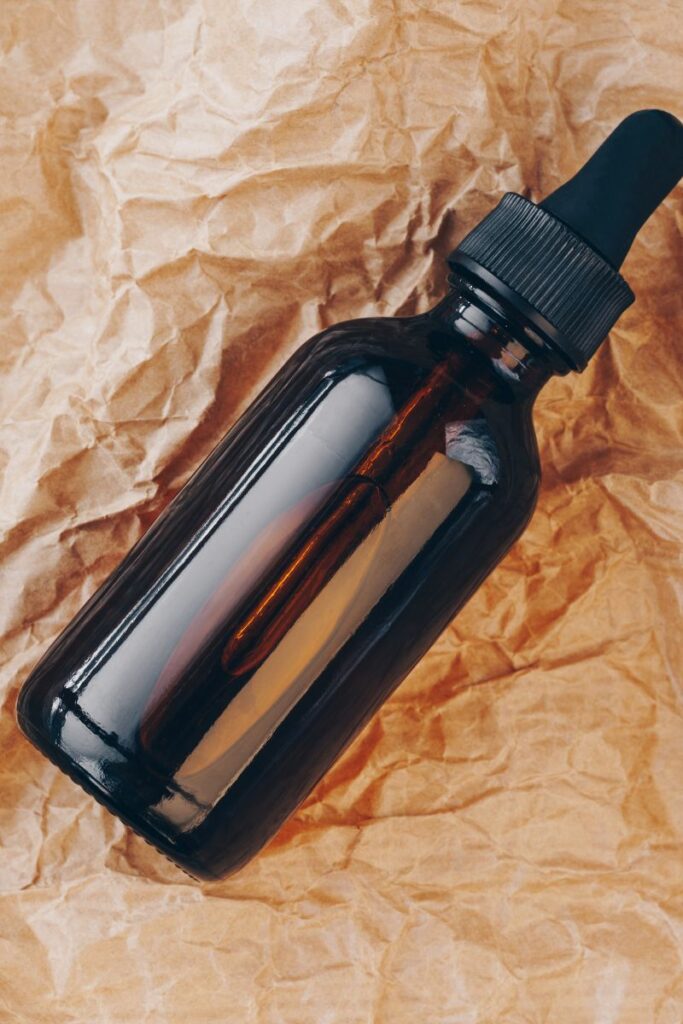
Traditional Uses of Elderberry Tinctures
Elderberry tinctures have been used for a long time as natural remedies for various health issues. They are known for providing immune support and helping to reduce flu-like symptoms during the flu season. Elderberries are also rich in vitamin C, making them a popular choice for boosting overall health.
Alcohol-Based vs. Non-Alcohol-Based Tinctures
Most tinctures are made with alcohol, like vodka tinctures, because alcohol is good at extracting and preserving the active components of the herb. However, not everyone can use alcohol-based tinctures due to alcohol sensitivities or medical conditions.
That's where non-alcohol-based tinctures come in. There are two great options for making elderberry tinctures without alcohol: glycerin tinctures and apple cider vinegar tinctures.
Glycerin Tinctures
Pros:
- Suitable for Kids and Alcohol Sensitivities: Glycerin tinctures use vegetable glycerin instead of alcohol, making them ideal for children, those with alcohol sensitivities, and anyone who prefers to avoid alcohol.
- Sweet Taste: Glycerin is naturally sweet, which can make the tincture more palatable, especially for kids.
- Preserves Well: Glycerin preserves the tincture effectively, giving it a good shelf life when stored properly.
Cons:
- Less Potent: Glycerin may not extract the medicinal properties of the herb as effectively as alcohol, potentially resulting in a less potent tincture.
- Thicker Consistency: The thick, syrupy consistency of glycerin can sometimes be harder to measure and mix into drinks or foods.
Apple Cider Vinegar Tinctures
Pros:
- Additional Health Benefits: Apple cider vinegar is known for its own health benefits, including aiding digestion and balancing pH levels, which can add an extra boost to your tincture.
- Effective Extraction: Apple cider vinegar is a good solvent for extracting the medicinal properties of herbs, making it an effective alternative to alcohol.
- Widely Available: Apple cider vinegar is easy to find in most grocery stores and is typically affordable.
Cons:
- Strong Taste: The strong, tangy taste of apple cider vinegar might not be appealing to everyone, especially kids.
- Acidity: The acidity of apple cider vinegar can sometimes be too harsh for people with sensitive stomachs or acid reflux.
Both glycerin and apple cider vinegar are excellent choices for making your own elderberry tincture without alcohol. Each has its own set of benefits and drawbacks, so you can choose the one that best fits your needs and preferences. Whether you opt for the sweet, gentle glycerin tincture or the potent, health-boosting apple cider vinegar tincture, you'll be making a powerful addition to your home apothecary.
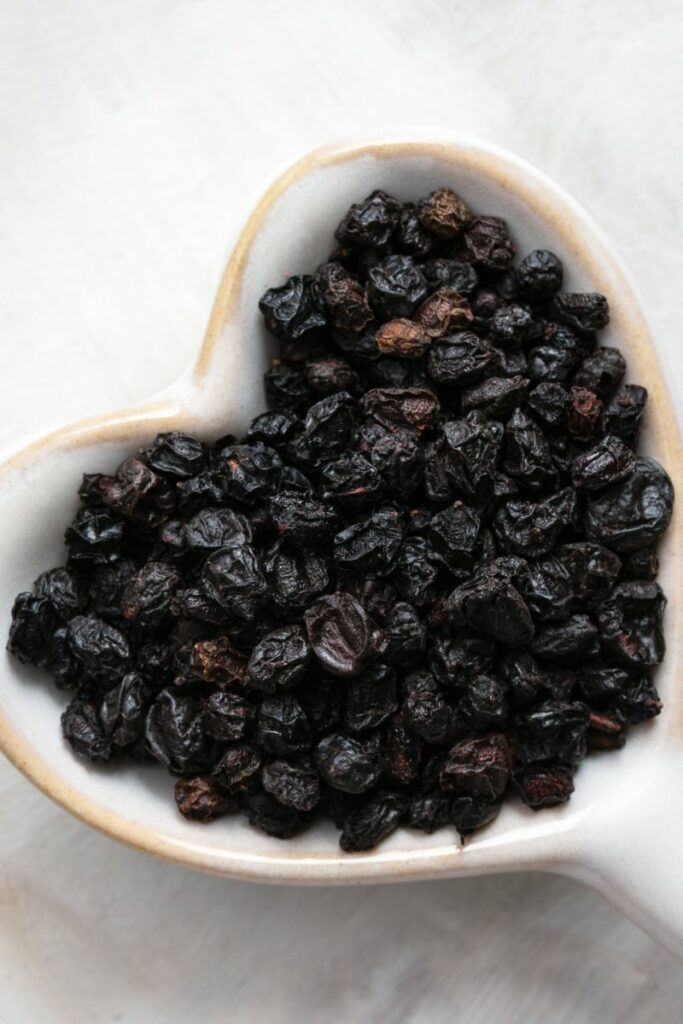
3 Main Benefits of Elderberries
Immune System Support
Elderberries are well-known for their powerful immune-boosting properties. They contain compounds that stimulate the body's natural defense mechanisms, helping to keep you healthy during the flu season and beyond. By supporting your immune system, elderberries can help reduce the severity and duration of illnesses.
Rich in Antioxidants
Elderberries are packed with antioxidants, including flavonoids and vitamin C. Antioxidants help protect your cells from damage caused by free radicals, which are harmful molecules that can lead to chronic diseases. By consuming elderberries, you're giving your body a boost in its fight against oxidative stress.
Helps Fight Cold and Flu Symptoms
Elderberries have been traditionally used as a natural remedy to help fight cold and flu symptoms. Studies have shown that elderberry extract can reduce the severity and duration of colds and flu. It helps relieve symptoms like fever, headache, sore throat, and fatigue, making it an excellent addition to your medicine cabinet during the winter seasons.
Elderberries are not only a powerful medicinal herb but also a tasty and versatile ingredient in various natural remedies. Whether you're looking to prevent illness or support your body's natural healing processes, elderberries are an amazing natural remedy to keep on hand.
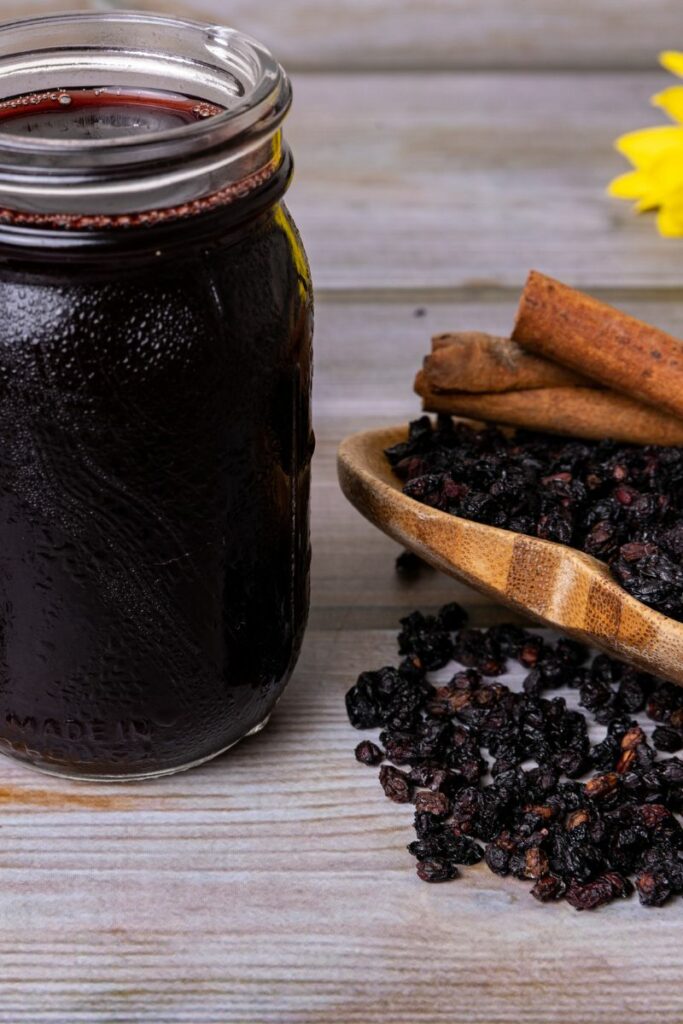
How To Make This Elderberry Tincture Recipe Without Alcohol
Ingredients Needed For This Recipe
To make your own elderberry tincture without alcohol, you will need a few simple ingredients. Here’s what you’ll need and why each ingredient is important:
Ingredients
- Fresh Elderberries or Dried Elderberries
- Use fresh elderberries if you can find them, but dried berries work just as well. Elderberries (Sambucus nigra) are the main ingredient and provide the medicinal properties that make this tincture a great way to support your immune system.
- Vegetable Glycerin
- Vegetable glycerin is used instead of alcohol. It's sweet and helps to extract the active components of the herb. Glycerin tinctures are perfect for those with alcohol sensitivities and are safe for kids.
- Distilled Water
- Distilled water is used to dilute the glycerin and make the mixture just right. Using distilled water helps to keep the tincture pure and free from any impurities.
- Apple Cider Vinegar (Optional)
- Apple cider vinegar is another option instead of vegetable glycerin. It helps extract the herbal properties and adds its own health benefits.
Tools
- Clean Jar with a Tight-Fitting Lid
- Use a clean jar like a mason jar to mix and store your tincture. A tight-fitting lid keeps everything sealed and fresh.
- Pint Jars and Oz Bottles
- You might want to use pint jars for the mixing process and oz bottles with dropper tops for storing and using the tincture. This makes it easier to measure small doses.
- Layers of Cheesecloth
- Cheesecloth helps to strain the berries from the liquid, ensuring you get a clear tincture.
- Medium Saucepan
- If you are using fresh elderberries, a medium saucepan can be used to gently heat them to release their juice before making the tincture.
Each of these ingredients and tools helps to make the process smooth and ensures you get a high-quality, effective elderberry tincture. Having these ready will make your first time making herbal tinctures a breeze!
Step-by-Step Recipe
Preparation
- Cleaning and Drying Elderberries
- If you are using fresh elderberries, rinse them well to remove any dirt or debris. Let them dry completely. If using dried berries, they are ready to use as is.
- Measuring Ingredients
- Measure out 1 cup of fresh elderberries or 1/2 cup of dried berries.
- Measure out 2 cups of vegetable glycerin and 1 cup of distilled water.
Mixing
- Combining Elderberries with Vegetable Glycerin and Water
- In a clean glass jar, add your elderberries.
- Pour in the vegetable glycerin and distilled water. The proper ratio is about 2 parts glycerin to 1 part water, but some use 3 parts glycerin to 1 part water for better shelf life.
- Proper Ratios for Optimal Extraction
- Ensure the elderberries are fully covered by the liquid mixture. This is important for optimal extraction of the medicinal properties.
Infusion
- Infusion
- Seal the jar with a tight-fitting lid and place it in a dark place at room temperature. Let it infuse for 4-6 weeks, giving it a good shake every few days.
- Tips for Shaking/Stirring the Mixture
- Shaking the jar every few days helps to mix the plant material and liquid, ensuring better extraction.
Straining
- How to Properly Strain the Mixture
- After 4-6 weeks, or when you feel the infusion is strong enough, strain the mixture using layers of cheesecloth. Place the cheesecloth over a clean jar or bowl and pour the mixture through it.
- Tips for Getting the Most Out of Your Elderberries
- Squeeze the cheesecloth to get all the liquid out of the berries. This ensures you get the most potent glycerite possible.
Bottling
- Best Practices for Bottling and Storing Your Tincture
- Transfer the strained tincture into dark amber glass bottles with dropper tops. These bottles protect the tincture from light and make it easy to use.
- Shelf Life and Storage Tips
- Label then store the bottles in a dark cabinet or any dark place to keep them away from direct sunlight. This helps maintain the tincture's potency.
- Properly stored, your elderberry tincture can last for a long time, usually up to a year.
By following these steps, you'll have a homemade, alcohol-free elderberry tincture that's a great addition to your medicine cabinet for the flu season and beyond!
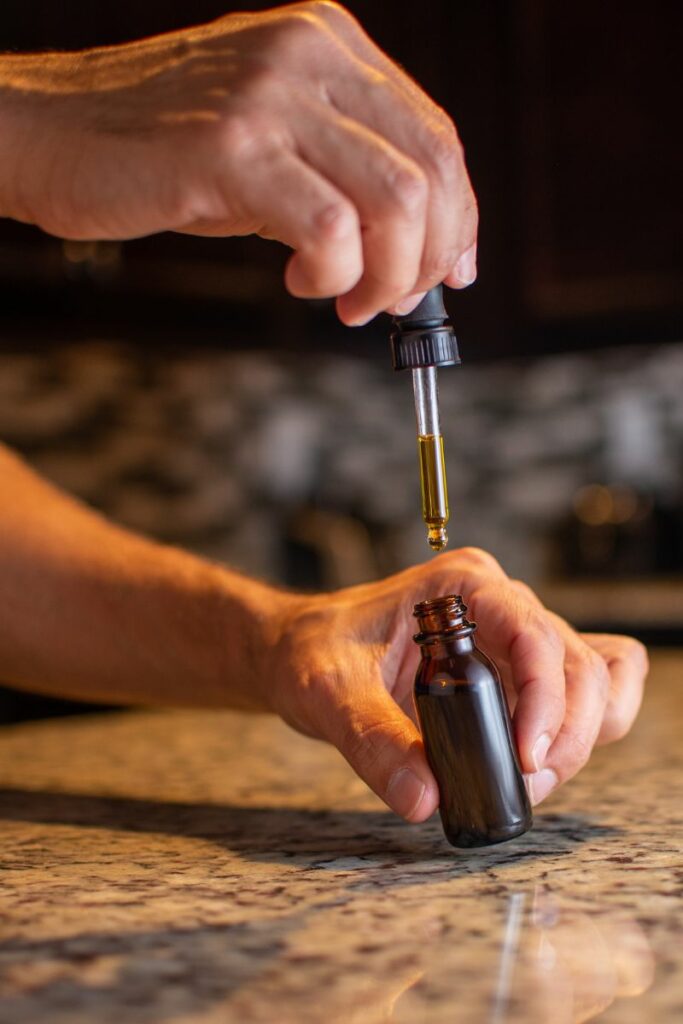
How to Use An Elderberry Glycerite
Suggested Dosages
- Adults: Take 1-2 dropperfuls (about 1/2 to 1 teaspoon) daily for immune support.
- Children: Take 1/2 to 1 dropperful (about 1/4 to 1/2 teaspoon) daily. Always check with a healthcare practitioner before giving to children.
- During Flu Season: Increase to 2-3 doses per day at the first sign of flu-like symptoms.
Ways to Incorporate into Daily Routines
- Teas
- Add a few drops of elderberry tincture to your favorite herbal teas, such as lemon balm or echinacea tinctures, for added immune support.
- Smoothies
- Mix a dropperful into your morning smoothie for a vitamin C boost.
- Water or Juice
- Simply add the tincture to a glass of water, elderberry juice, or any fruit juice for an easy way to take it daily.
- Oatmeal or Yogurt
- Stir it into your oatmeal or yogurt for a tasty and healthy start to your day.
- Elderberry Syrup Recipe
- Use the tincture in homemade elderberry syrup recipes for added potency and longer shelf life.
Safety Tips and Considerations
- Allergic Reaction: Monitor for any signs of allergic reactions, especially if it's your first time using elderberry tincture. Symptoms may include itching, swelling, or difficulty breathing. If these occur, stop use immediately and seek medical advice.
- Medical Condition: If you have any medical conditions or are taking medication, consult a healthcare practitioner before using elderberry tincture. Elderberries may interact with certain medications.
- High Doses: Avoid high doses, as they can cause digestive upset. Stick to the suggested dosages unless advised otherwise by a healthcare professional.
- Alcohol Sensitivities: If you have alcohol sensitivities, make sure you are using a glycerin or apple cider vinegar-based tincture.
- Unripe Berries and Raw Berries: Never use unripe berries or raw berries, as they can be toxic. Always use ripe, cooked, or properly dried elderberries.
By incorporating elderberry tincture into your daily routine, you can take advantage of its amazing natural remedy benefits, supporting your immune system and overall wellness throughout the school year and flu season.
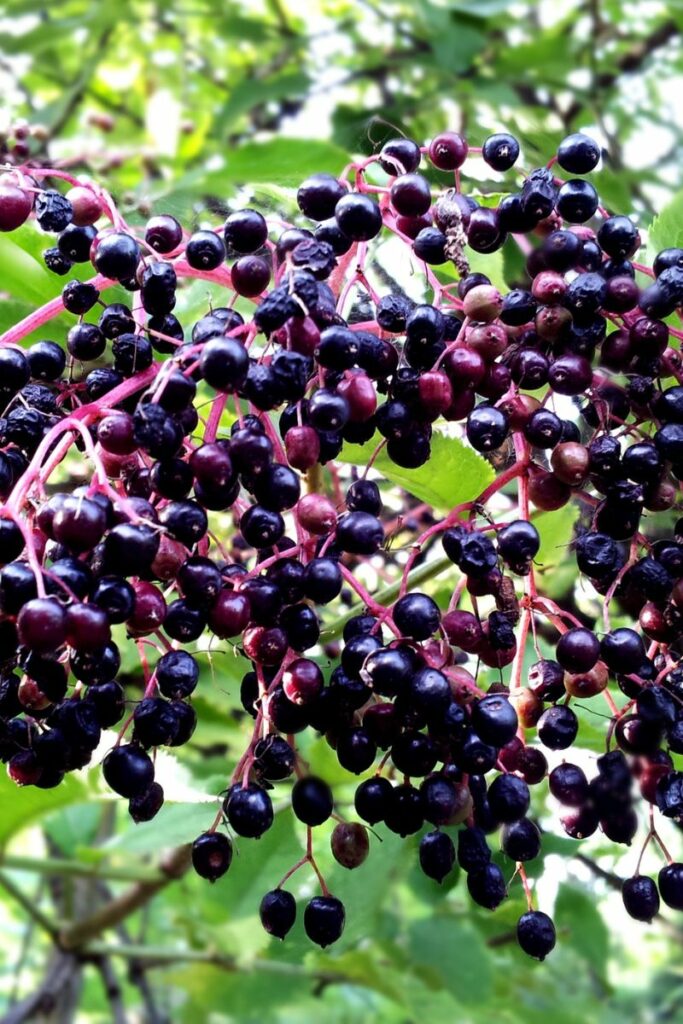
7 Other Herbs to Add to Your Elderberry Glycerite
Adding other herbs to your elderberry glycerite can enhance its benefits and provide a wider range of medicinal properties. Here are some great herbs to consider:
1. Echinacea
- Benefits: Echinacea is well-known for its immune-boosting properties. It can help fight off infections and reduce the severity of colds and flu.
- How to Use: Add dried echinacea roots or leaves to your elderberry mixture to create a powerful immune support glycerite.
2. Lemon Balm
- Benefits: Lemon balm has antiviral properties and can help calm the nervous system. It’s also great for reducing stress and anxiety.
- How to Use: Add dried lemon balm leaves to your elderberry glycerite for a soothing and calming effect.
3. Ginger
- Benefits: Ginger is excellent for digestion and has anti-inflammatory and antiviral properties. It can help soothe sore throats and reduce nausea.
- How to Use: Add fresh or dried ginger root to your glycerite to give it an extra kick and boost its medicinal properties.
4. Cinnamon
- Benefits: Cinnamon is rich in antioxidants and has anti-inflammatory and antimicrobial properties. It can help regulate blood sugar levels and improve circulation.
- How to Use: Add a few cinnamon sticks or ground cinnamon to your elderberry glycerite for a warm, spicy flavor and added health benefits.
5. Cloves
- Benefits: Cloves have powerful antioxidant, antiviral, and pain-relieving properties. They can help boost the immune system and fight infections.
- How to Use: Add whole or ground cloves to your glycerite to enhance its flavor and medicinal effects.
6. Rosehips
- Benefits: Rosehips are very high in vitamin C and antioxidants. They support the immune system and help with skin health.
- How to Use: Add dried rosehips to your elderberry mixture for an extra dose of vitamin C and a tart flavor.
7. Astragalus
- Benefits: Astragalus is known for its immune-boosting and anti-inflammatory properties. It can help protect against colds and flu.
- How to Use: Add dried astragalus root slices to your glycerite for long-term immune support.
When adding other herbs to your elderberry glycerite, make sure to use organic ingredients and properly measure them to maintain the balance of flavors and medicinal properties. Combining these herbs with elderberries can create a powerful, multi-benefit glycerite that supports your health in many ways.
Just be sure to check other side effects or precautions associated with these additional herbs.
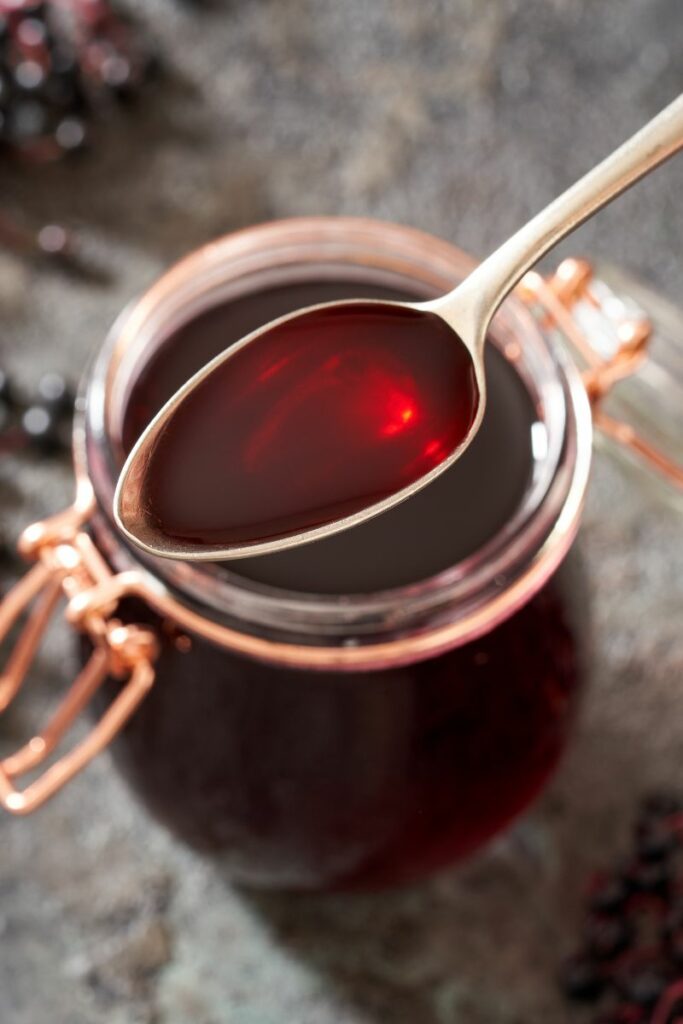
Frequently Asked Questions
Can I use dried elderberries?
Yes, you can use dried elderberries to make your elderberry tincture. Dried elderberries work just as well as fresh elderberries and are often easier to find. Make sure to measure correctly, using about half the amount of dried berries compared to fresh berries. For example, use 1/2 cup of dried elderberries instead of 1 cup of fresh elderberries.
How long does it take to see benefits?
The time it takes to see benefits from elderberry tincture can vary. Some people notice improvements in their immune support and reduction of flu-like symptoms within a few days of regular use, especially during flu season. For overall health and wellness, consistent use over several weeks may be necessary to see significant benefits.
Can children use this?
Yes, children can use elderberry tincture, but it's important to use the correct dosage and consult with a healthcare practitioner before giving it to them. A typical dose for children is 1/2 to 1 dropperful (about 1/4 to 1/2 teaspoon) daily. Always monitor for any signs of allergic reactions or side effects.
Any side effects to be aware of?
Elderberry tincture is generally safe for most people, but there are a few side effects and considerations to keep in mind:
Digestive Upset: Taking high doses can cause stomach upset or diarrhea. Stick to the recommended dosages.
Allergic Reactions: Some people might be allergic to elderberries. Symptoms can include itching, swelling, or difficulty breathing. If you experience these, stop use immediately and seek medical advice.
Unripe or Raw Berries: Avoid using unripe berries or raw berries, as they can be toxic and cause nausea or vomiting. Always use ripe, cooked, or properly dried elderberries.
Medical Conditions and Medications: If you have any medical conditions or are on medication, check with your healthcare practitioner before using elderberry tincture to ensure it’s safe for you.
Elderberry tincture is a great way to support your immune system and overall health, but like any herbal remedy, it’s important to use it correctly and safely.
Conclusion
Elderberry tincture is an amazing natural remedy with numerous benefits. It supports your immune system, is rich in antioxidants, helps fight cold and flu symptoms, and promotes overall health and wellness. Making your own elderberry tincture without alcohol is a great way to incorporate these benefits into your daily routine, especially during the flu season.
Whether you use glycerin or apple cider vinegar, this easy recipe allows you to create a potent herbal medicine right at home. Plus, it's suitable for both adults and children, making it a versatile addition to your home apothecary.
Other Articles You Might Like
